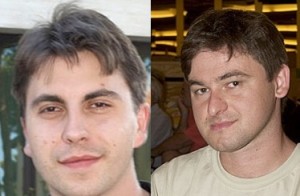leggi in italiano »
 Laura Cecilia Porro, with the precious collaboration of Marek Wòjcicki, realized a short interview to the Polish bridge champions Grzegorz Narkiewicz and Krzysztof Buras. They achieved many results in the Junior and Open categories. In the latter his best result is the second prize in the European Championships in Ostend (2010). In addition to the usual English version, in homage to our many readers from Poland, we publish also a Polish edition of the interview.
Laura Cecilia Porro, with the precious collaboration of Marek Wòjcicki, realized a short interview to the Polish bridge champions Grzegorz Narkiewicz and Krzysztof Buras. They achieved many results in the Junior and Open categories. In the latter his best result is the second prize in the European Championships in Ostend (2010). In addition to the usual English version, in homage to our many readers from Poland, we publish also a Polish edition of the interview.
Tell us about the beginnings of your partnership
We first started playing together in 2003. Our first more serious tournament was academic world championships in Istanbul in 2004 where we won gold, beating amongst others very strong USA team. The rest was simple. We’ve reached new quality level when we started playing regularly in American nationals (our first one being Vanderbilt 2006 where we got to quarterfinals).
Was everything perfect from the very beginning or did you have to work hard to achieve the results?
Was everything perfect… Looking back at 10 years of playing together we can tell how much work we put into the partnership to play at our current level. It was work both individual and in pair, tweaking the system, agreeing defensive methods. I think that constant work on the system, tracking new theoretical solutions in bidding led us to the point where our system is one of the most refined, especially in two-sided bidding. It’s important that we both understand we have to develop our skills all the time, that progress doesn’t come from anything else but from hard work. And so do the results. From work at the table, motivation to put up hard fight, concentration.
When did you first decide to make bridge your source of income?
After we both graduated we had to ask ourselves a difficult question: “What’s next?”. I think it’s because it happened when we started achieving more, and we felt we can still do much better, the answer was obvious. Especially that to make your living doing something you love the most is very important for the quality of life. A little bit of talent in the marketing department, couple of big wins and the most important of all a lot of work.
How important is atmosphere at the table? Do you prefer to discuss the boards immediately at the table or perhaps after the round is over? How does this sort of discussion influence the results?
You’ve touched (we’re guessing not accidentally) our weak spot… Would this be by any chance due to the bulletin article featuring slang “Narky”? Concentration at the table, the tension during the round translates to the need of releasing the pressure during break. I work on changing this. When will the discussion have merit? Definitely not in between matches. In the evening, during dinner. Besides, recognizing and respecting partner’s skill level we do not discuss technical errors – we can all see them and work individually on leads and declarer play. Discussion only makes sense if it is regarding agreements or style of bidding, way of thinking while defending – in other words problems that have to be solved together, need cooperation and understanding.
***
Laura Cecilia Porro
July 25, 2012
Opowiedzcie o początkach waszej pary
Zaczęliśmy grać razem w 2003 roku. Pierwszym poważniejszym turniejem były akademickie mistrzostwa świata w Istambule w 2004 roku, gdzie zdobyliśmy złoty medal, pokonując m.in. USA z m.in. Johnem Kranyakiem w składzie. No i potem poszło… Na jakościowo nowy poziom weszliśmy, gdy zaczęliśmy grać regularnie w turniejach amerykańskich, od Vanderbilta 2006, gdzie w debiucie doszliśmy do ćwierćfinału.
Czy wszystko grało od samego początku, czy też musieliście ciężko pracować, aby zobaczyć efekty?
Czy wszystko grało… Z perspektywy prawie 10 lat wspólnej gry można ocenić, ile pracy włożyliśmy, aby grać na takim poziomie, jak teraz. Zarówno indywidualnej, jak i wspólnej, nad systemem licytacyjnym, grą w obronie. Wydaje mi się, że nieustanna praca nad systemem, śledzenie nowości teoretycznych, doprowadziła do tego, że wśród polskich par nasz system jest jednym z najlepiej dopracowanych, zwłaszcza w licytacji dwustronnej. Ważne w tym jest to, że obaj jesteśmy przekonani, że cały czas trzeba się rozwijać, że postępy nie biorą się z niczego innego jak z pracy. I wyniki też. Z pracy przy stole, motywacji do walki, koncentracji.
Kiedy postanowiliście, że będziecie utrzymywać się z gry w brydża?
Po ukończeniu studiów obaj stanęliśmy przed pytaniem: „Co dalej?” Ponieważ zbiegło się to w czasie ze znaczącym postępem w naszych wynikach, a czuliśmy, że rezerwy są jeszcze głębokie, odpowiedź narzucała się sama. Zwłaszcza, że utrzymywać się z tego, co lubi się najbardziej, to dla jakości życia sprawa podstawowa. Trochę talentu o charakterze marketingowym, trochę sukcesów, no i przede wszystkim dużo pracy, i tak to poszło…
Jak istotna jest atmosfera przy stole? Wolicie przedyskutować rozdanie natychmiast, czy po skończonej rundzie. Czy taka dyskusja wpływa pozytywnie, czy negatywnie na wyniki?
Dotknęłaś, pewnie nie bez powodu, pięty achillesowej naszej pary… Czyżby to efekt artykułu w biuletynie z tłumaczeniem slangowego „Narky”? Koncentracja przy stole, napięcie w trakcie rundy, przekładają się na potrzebę odreagowania w przerwie. Pracuję nad tym, aby to się zmieniło. A kiedy powinna być dyskusja merytoryczna? Na pewno nie w przerwie, między meczami. Wieczorem, przy kolacji. Poza tym… Uznając klasę i umiejętności partnera, nie podejmujemy dyskusji o błędach technicznych – każdy z nas je widzi i pracuje nad umiejętnościami w zakresie wistu i rozgrywki. Wspólna dyskusja ma sens, gdy dotyczy ustaleń bądź stylu licytacji, sposobu rozumowania w grze obronnej – jednym słowem problemów, które przy stole muszą być rozwiązane wspólnie, wymagają porozumienia i zrozumienia.
***